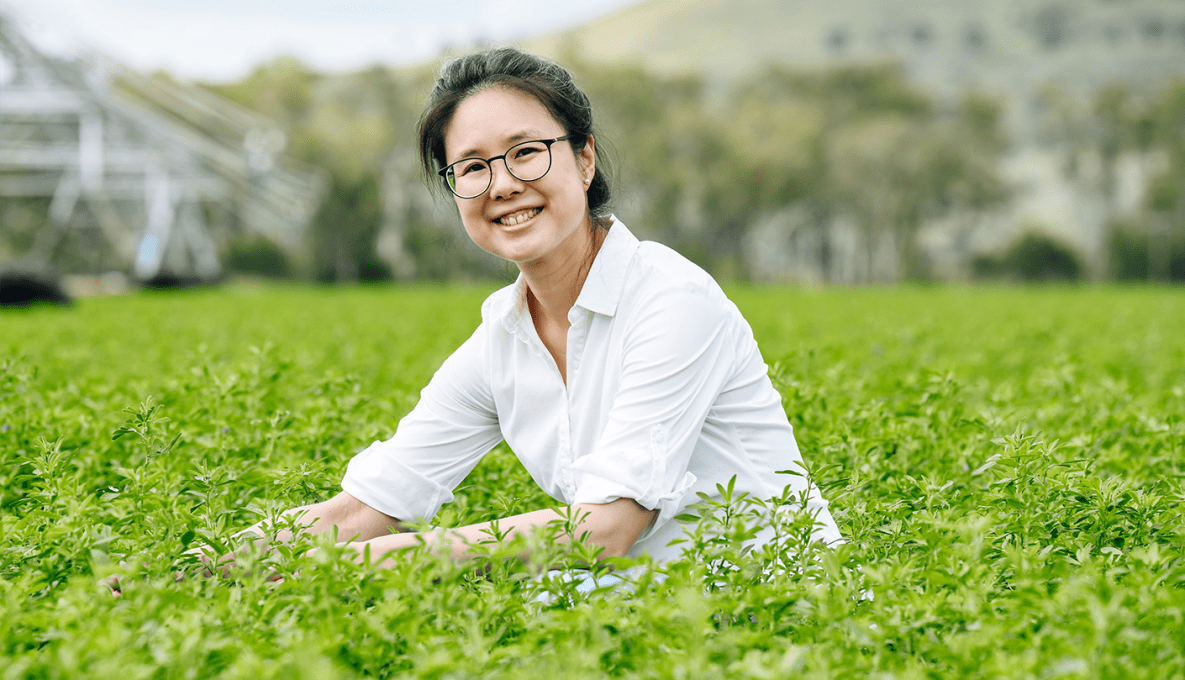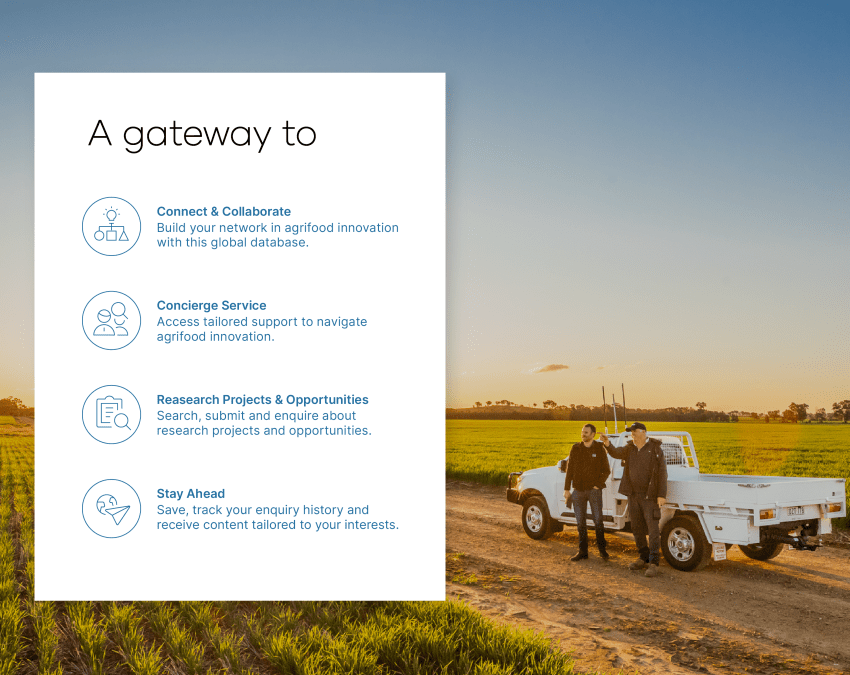-contain-250x120.jpg)
US$1m cap raise to help The Leaf Protein Co. supply the clean label ingredients plant protein companies want
The growᴬᴳ⋅ team last spoke with Fern Ho 12 months ago, when the product development executive was searching for investors to support market testing for a new plant protein ingredient. So positive was that feedback that The Leaf Protein Co. is back – with a US$1 million opportunity to help The Leaf Protein Co. scale from the lab to pilot production.^

In a world where consumers are growing more conscious of the environmental and ethical implications of their food choices, alternative proteins have emerged as a rapid growth category. Appealing to not just vegans and vegetarians, but ‘flexitarians’ who just want to reduce their intake of animal products, the demand for plant proteins is rapidly climbing.
The global market for alternative proteins is tipped to grow from US$44 billion in 2022 to US$161 billion in 2030. Australia’s own share of that plant-based pie could reach US$5 billion by 2030, and create 6,000 new jobs.
But there’s one undeniable challenge for the protein sector’s new kid on the block: an over-reliance on just a few plant protein sources.
“There’s been a huge explosion of plant-based food options on the market, anything from the increasing number of plant-based meat brands to plant-based dairy products, obviously plant-based milks but also now cheese and yoghurts, as well as general packaged foods like sauces and better-for-you products like protein supplements. Despite the multiple product categories that plant-based foods are popping up in, most manufacturers actually rely on just three proteins: soy, wheat, and pulses like peas,” explained Fern, co-founder and CEO of The Leaf Protein Co.
FIND OUT MORE ABOUT THIS OPPORTUNITY: The Leaf Protein Co.: Nutritious, highly functional alternative plant protein ingredient - seeking $US1 million seed investment, partners to establish pilot manufacturing^
Related organisations
-contain-250x120.jpg)

“90% of the plant protein ingredient market is supplied by soy and wheat – and that overdominance creates real challenges for food manufacturers to truly create these huge varieties of plant-based alternatives with the taste and nutrition to make repeat customers and true converts of consumers who don’t normally or fully subscribe to plant-based alternatives.
“Also, there’s a growing number of consumers with food allergies or intolerances, and others who just choose to actively reject these ingredients for health and, or environmental reasons,” explained Fern.
“And many consumers are starting to question the long-term environmental and biodiversity impact of large-scale monoculture crops like soy. Our mission is to increase the biodiversity of plant protein ingredients that are currently available in the market, so food manufacturers can create the plant-based foods that the market wants.”
Unlocking the world’s most abundant protein source
RELATED: Opportunity to invest in the tiny chip set to revolutionise animal healthcare^
The Leaf Protein Co.’s solution is to look beyond what we’ve traditionally seen as the protein powerhouse of a plant – its’ seed – and to its leaves instead. And specifically, the leaf protein enzyme, RuBisCo.
Ribulose-1,5-bisphosphate carboxylase oxygenase plays a pivotal role in fixing atmospheric carbon. Without it, plants couldn’t photosynthesise and the creatures – including us – who depend on plants couldn’t exist.
For food manufacturers, it features a range of characteristics that make it a real contender in the field of plant proteins:
- A well-rounded full essential amino acid profile
- freedom from major allergens, making it ideal for consumers with dairy, egg, soy and wheat intolerances
- Emulsification, chelation and foaming capacity (the characteristics that food companies need to recreate texture and mouthfeel in meat and dairy analogues), and
- Properties that render it suitable for broader food manufacturing processes, as an emulsifier, foaming and gelling agent.
Because every leaf on earth contains RuBisCo, there are tremendous opportunities to maximise the sustainability benefits too. And it’s here where The Leaf Protein Co.’s passion lies.
Extracting protein – and value – from the leaves we’d normally toss out

Being an enzyme protein, RuBisCo is fundamentally the same protein isolate, irrespective of which plant it comes from.
“But driven by sustainability, there are two sources of leaf biomass material that interest us,” said Fern. “Perennial and regenerative plants that help to repair degraded farmland; and the waste streams of existing horticultural supply chains.”
Saltbush is one example of a regenerative plant, and is already grown across parts of Australia to rehabilitate saline soil. “Depending on the variety and the soil conditions, saltbush leaves can have a natural protein content of up to 30% - comparable to soybeans and even higher than wheat which is normally around 10-20% protein. However, unlike growing crops for soybeans and wheat, crops for leaf protein require much less water and fertilising, while being able to produce at least double the amount of protein per acre. So not only is it a more productive crop, it’s also a more efficient and sustainable use of farmland,” said Fern.
It seems the abundance of leaf material extends to existing leaf waste, which Fern is also setting her sights on as a valuable source.
RELATED: Bid for CRC for Alternate Proteins aims to capture billion-dollar benefits^
“A lot of leafy green biomass is discarded throughout the horticulture and fresh produce supply chain. Like carrot and celery tops and broccoli and cauliflower leaves that get cut off in the packing shed,” explained Fern. “And at market, retailers will strip the outer layers off cabbage and lettuce to improve the product’s appearance and appeal to consumers' expectations of what fresh produce should look like.”
“There are many opportunities to valorise this waste stream into high value, sustainable protein. We’ve had good feedback from growers, so we’ve got a research project going on now to investigate how we can capture this waste protein as well as other side-streams like functional fibre to create high-value plant-based ingredients.”
Thoughtful design delivers the ‘clean’ ingredient food manufacturers need
With a nod to the nagging criticisms food manufacturers face around the processes used to turn plants into meat or dairy, The Leaf Protein Co. has designed a thermomechanical method that delivers what the industry calls a ‘clean label ingredient.’
“Traditional plant protein extraction, particularly for pulses, often uses chemicals and solvents,” explained Fern. “Because we use a purely thermomechanical process, our final ingredient is free from chemical residue.”
“It means food manufacturers can access the natural ingredients they want, and really start to meet consumer expectations for plant-based foods that not only taste good but also offer the nutritional benefits that most consumers expect with plant-based diets.”
-crop-672x478.png)
Off the back of strong feedback from food manufacturers, The Leaf Protein Co. is seeking US$1M to help it scale from lab to pilot production.
“The last 12 months have seen many long nights for my co-founder and Chief Scientific Officer, Connor Balfany, in the lab, producing samples for potential customers across three main categories: plant-based meat, plant-based dairy, and the big one: the ‘Better for You’ category,” explained Fern.
Offering fortified and functional foods with added ingredients that boost the overall nutritional value of a food product, Better for You caters to the growing number of discerning consumers motivated by a food’s health attributes.
With potential food brands and manufacturers clamouring for samples, Fern is eager to get pilot-scale production off the ground.
“We’ve nailed down our pilot plant location and have strong interest from local producers whom we’ve already started working with. We’re both equally excited about being able to use their existing crops more efficiently for multiple harvests for leaf protein material, compared to traditional cropping,” said Fern.
“This raise will help us operationalise our pilot plant and scale from the gram we currently produce in the lab, to the hundreds of kilograms we need to progress trials with food manufacturers.”
But the team isn’t sitting on their hands waiting for investors to knock on the door. “We’ve been busy sourcing the equipment and planning the setup of the processing plant. And we’ve identified some of the first key team members who’ll operate that facility,” explained Fern.
“We’re really looking forward to this next phase of The Leaf Protein Co where we start to grow the team and scale production,” added Fern. “Ultimately, this all leads to our mission, which is to help consumers eat better plant-based foods, which can only happen if we give food manufacturers a better variety of plant-based ingredients.”
Excitement builds for evokeAG. 2023 Investor Pitch
A member of evokeAG.’s 2023 Startup Network, The Leaf Protein Co. is featuring at Startup Alley in this year’s evokeAG. event. “I'm really looking forward to showcasing our leaf protein ingredients – giving people the chance to see, touch and smell them,” said Fern.
evokeAG. 2023 will be a big event for Fern, who has also been selected to pitch to the Investor Dinner. “Telling our story to domestic and international investors is a huge opportunity. We’re looking for investors who share our commitment to creating better foods, but who might also have their own entrepreneurial experience; who’ll understand the challenges, and provide us with the right support to accelerate what we’re trying to achieve.”
To find out more about evokeAG. 2023, click here.
Hear more from Fern Ho in a panel discussion at evokeAG. 2023 on 21 February 2023. Fern will join John Harvey, AgriFutures Managing Director, and Craig Baillie, Head of School & Dean Agriculture & Environmental Science, University of Southern Queensland, to discuss how collaboration is helping accelerate innovation and commercialisation.
^This investment opportunity is only for professional and sophisticated investors as defined in the Corporations Act 2001 (Cth). The content of this opportunity is intended for use by persons having professional experience in matters relating to investments and must not be acted or relied upon by any other person including, without limitation, retail clients.
-crop-850x675.png)
Looking for engagement?
Showcase your commercialisation opportunity today.
Talk to our team to discuss how growAG. can connect your innovation to industry.
Have questions? Find answers to our most frequently asked questions on research projects, commercial opportunities, organisations and more.
